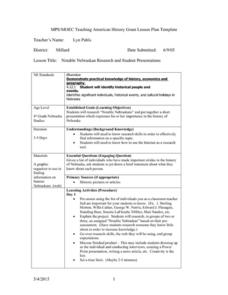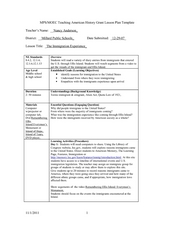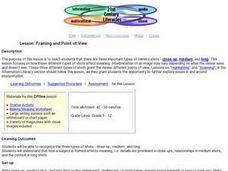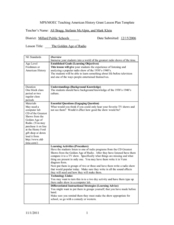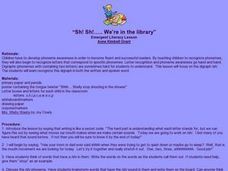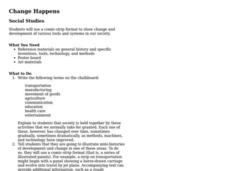Curated OER
The Diary of Anne Frank
Eighth graders read the Diary of Anne Frank. In this novel reading instructional activity, 8th graders read and analyze the story. Students do online activities and create a newspaper giving a summary of three major events in the story....
Curated OER
Uncovering Personalities in Othello
Students explore a unique way to view the personalities of the characters in William Shakespeare's play "Othello." They facilitate online research "deconstructing" poetry and performing scenes from the play with costumes and props.
Curated OER
Social Studies: Shaking the Family Tree
Create family trees while reading "Little House in the Big Woods." After examining Laura Ingalls Wilder's family tree, compare it to a real tree's roots and branches. Conclude with interviewing family members and decorating family...
Curated OER
Atomic Bomb Debate
Students research the decision to end World War II by dropping the atomic bomb. For this world history lesson, students explore information on the atomic bomb and the decision of the tactics to use it. They also watch a video and plan...
Curated OER
Is FEMA a Natural Disaster?
Students develop an understanding of FEMA and reflect about the consequences of a natural disaster. In this natural disaster lesson, students are asked specific questions after reading several stories. After class discussion on the...
Curated OER
Inch By Inch
Students explore the concept of measuring length using a one-inch pipe cleaner "inchworm." They listen to the story "Inch By Inch by Leo Lionni and discuss how the animals were measured by the inchworm in the book. In pairs students...
Curated OER
The Technological Impact on 1950's Culture
Students examine the impact of technological advancements on Cold War America. In this 1950's America lesson, students research politics, Cold War society, suburbia, and consumerism during the decade in order to better understand...
Curated OER
Enemy or Ally: America's Response to the Russian Revolution
Learners examine the events related to the Russian Revolution. In groups, they use the internet to discover the concerns of Woodrow Wilson during this time period and relate them to the origins of the Cold War. To end the lesson, they...
Curated OER
Notable Nebraskan Research and Student Presentations
Fourth graders explore notable Nebraska. In this instructional activity on the history of Nebraska, 4th graders will use primary sources to research people of events from Nebraska's history. Students will create a presentation to share...
Curated OER
Reading: A Speech by Helen Keller
In this Helen Keller worksheet, students read a speech that was delivered by Helen Keller in 1925. Students answer 8 true and false comprehension questions.
Curated OER
What did I find?
Students excavate an artifact. In this archaeology lesson plan, students get a bucket filled with dirt and a broken up artifact. They work in groups to take it out and to find what its purpose was.
Curated OER
Understand the Push Pull Theory of Immigration
Students examine the Push Pull Theory of immigration. In this instructional activity on immigration, students explore primary sources to discover several reasons why people migrate. They will then present skits to share this information....
Curated OER
The Immigration Experience
Students research the reasons people immigrated to the United States. In this United States history lesson plan, students explore the causes and effects of immigrating. Students engage in a role-playing scenario , watch a video, and...
Curated OER
Diversity: Origin Myths
Fifth graders analyze origin myths and the diversity of First Nations groups. In this history lesson, 5th graders review the geography of Canada and read various origin myths. Students illustrate one of the myths and research others in...
Curated OER
Framing and Point of View
Students identify three types of camera shots. They discover that how a subject is framed affects the meaning of the photo.
Curated OER
Transportation Math
Students explore the concept of exponents. In this exponents lesson, students evaluate various bases to powers. The bases to a given power are in the context of miles driven, stops on a route, and minutes spent in route. Students read...
Curated OER
Polygon Necklaces
Students explore geometry by creating jewelry in class. In this polygons lesson, students identify different shapes and characteristics while creating polygon figures from construction paper. Students utilize a multitude of shapes to...
Curated OER
The Golden Age of Radio
Eleventh graders analyze popular radio shows of the 1930’s-1940’s. In this American History lesson, 11th graders examine life before television and one of the ways people entertained themselves. Students present their radio show as a...
Curated OER
What's the Hold-Up?
Students explore the current plan by New York City Mayor Michael Bloomberg to retain underperforming third graders in public schools. They research and debate social promotion versus retention.
Curated OER
Sh! Sh! We're in the Library
Students focus on the diagraph of sh. They recognize this in both the written and spoken word. To introduce this instructional activity, the teacher asks if anyone's mom or dad has told them shhhh, when they were trying to get them to...
Curated OER
Solstice And Equiniox Curriculum
Students engage in a lesson that investigates finding the dates of the solstices and equinoxes. They define the terms related to the concept and conduct research in order to explain the physical occurrences. They also relate to how the...
Curated OER
Symbols: A Reaction to Their Power
Students explore the concept of symbolism. In this social studies lesson, students examine primary and secondary sources regarding the use of symbols in the past and the impact of symbols in today's culture.
Curated OER
Change Happens
Students research different inventions that have changed over time. They use a comic strip format to illustrate how an area has changed. They share their comic strips with the rest of the class.
Curated OER
Archaeology is ...
Students demonstrate the importance of context for learning about ancient people. They assess the importance of preservation of cultural resources. They exchange papers with a student in class. The students with the paper are responsible...










